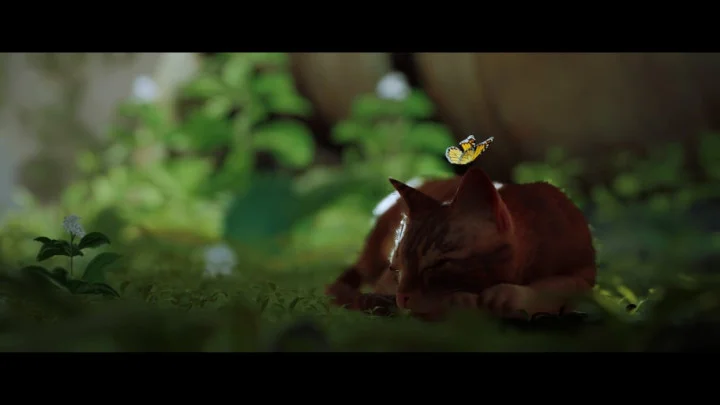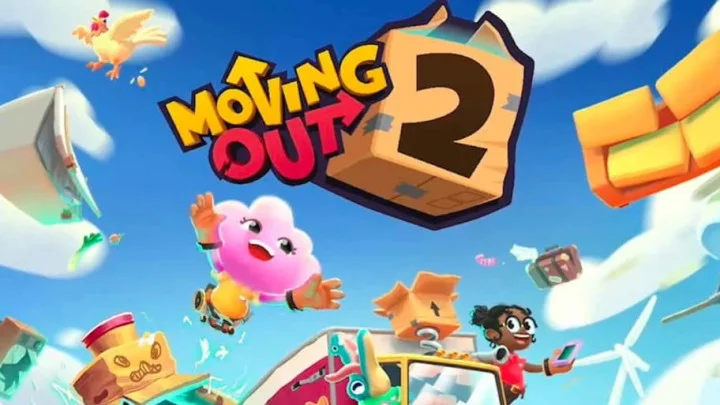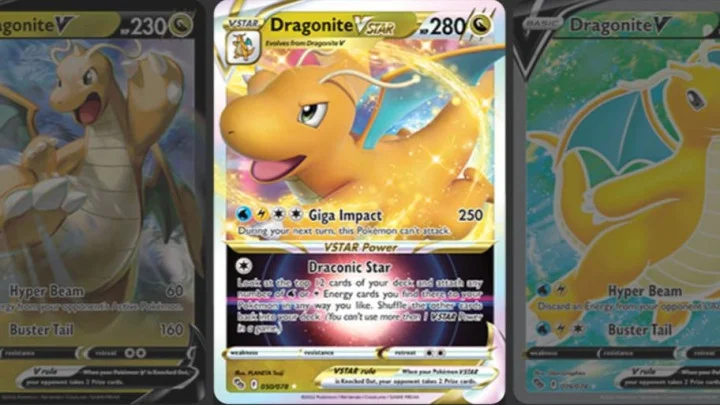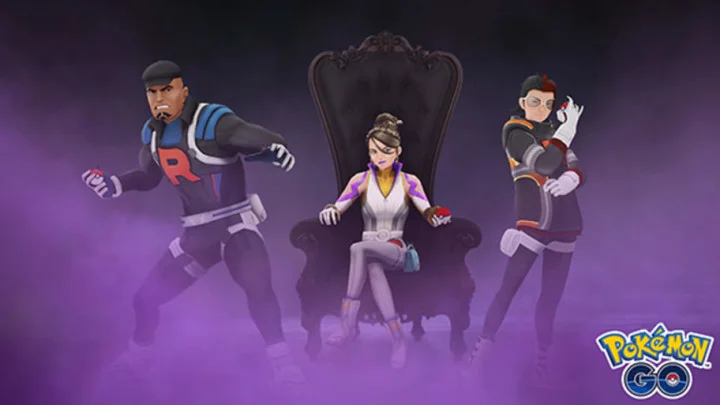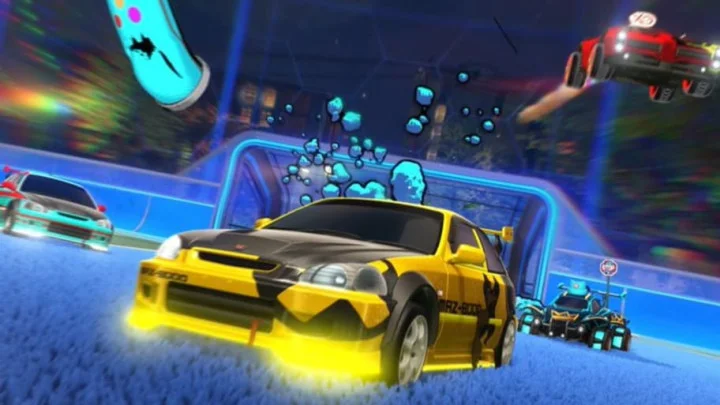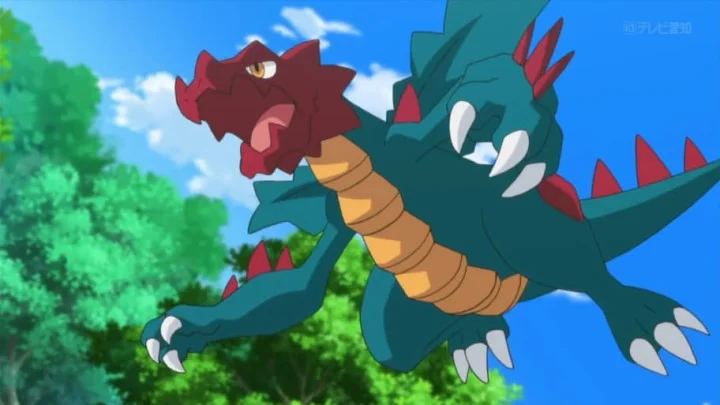We recently had the opportunity to jump paws-first into Stray, the latest indie adventure game told from the perspective of none other than a lost cat.
Right off the bat, the visuals are both stunning and adorable. The world is vibrant and looks alive with excellent rending and complimentary lighting throughout each area. Whether the game needs you to believe you’re in the debris of an overgrown plant freshly after a rainstorm or walking along a major street beneath a cement sky, the palette choice and sound design easily convey each location. The cybercity’s ambient noise is well mixed to the point that going inside buildings and having it be absent is realistically noticeable.
That’s not to say that the game is hyper realistic — and, truthfully, it doesn’t need to be to sell the experience. I’d dare to say that any more realism would’ve verged on an uncomfortable level of uncanny valley. It has the purr-fect aesthetic to tell the tale it wants. The world of Stray feels truly, deeply alive.
There are noticeable clipping issues here and there between the cat and some models, the drone sidekick, and even random important elements in the world. Most of these are minor, but in a game that takes detail so seriously as to purposefully fade the opacity of painted paw-prints as the cat leaves a spill, seeing them was a bit disappointing. Fortunately, they were rarely egregious enough to break the immersion that Stray creates so well.
Stray’s gameplay meets expectations, but doesn’t so much exceed them. Players start the game encouraged to simply… be a cat. It rewards them for doing things that cats do like clawing, snoozing, and knocking things over — and being naturally curious. You probably won’t even notice that it’s teaching you how to play. Most of the strategies I used to solve puzzles are learned simply from existing in the mind space of a cat and interacting with new items I had never seen before. Some were useful, like hiding in a box. Others were just objectively funny and achievement worthy.
Next to nothing is explained to the player and, weirdly, in this instance, it works extraordinarily well. This was one of the highest selling points for me. There was no need for lengthy tutorials or exposition, players simply learn by doing what came naturally.
Actually playing Stray has been among the smoothest experiences I’ve ever had. The game’s physics keeps you centered on any obstacles with no fear of falling off or rushing ahead to your demise. The button prompts can be a little confusing, appearing just a second too slow to know exactly where you’re headed or finicky enough to send you to the wrong place if you aren’t completely paying attention. The biggest drawback is how it handles momentum when sprinting across the map. At times, this feels a little too heavily weighted for an 8 lbs orange tabby cat, making sharp turns and stealth gameplay more difficult than it needs to be.
However, once the novelty of “being a cat” wears off, there isn’t much that makes Stray stand out as a puzzle/platform adventure title. Its most unique control is the “meow” button that acts as a sort of “cry for help” until the player is united with their drone sidekick. After that, it serves as a way to interact with the NPCs — for better or worse. Movement and exploration are largely informed by the default limitations of being a cat and the smaller size of the map.
Once I learned how the game worked, most obstacles and paths came intuitively and the solutions to puzzles followed soon afterward. Gameplay is simplistic and straightforward. Stray excels at prioritizing the instinctual behavior of the player.
Unfortunately, puzzles and questing are where my favorite thing about the game quickly became tedious. As I said, the “meow for help” feature only lasts as long as the first few areas. Once united with the drone, players are left largely on their own to figure things out with little to no help when they get stuck. The drone can regurgitate the basic principle of the current quest, but its dialogue tends to remain static regardless of how many hits the players pick up. You would think, with it acting largely as the translator between NPCs and the cat protagonist, that any useful information would automatically be registered — an NPCs preference for drinking or distaste for loud music, for example.
This simply doesn’t happen leading to frustration and running in circles. It’s obvious this is meant to encourage players to meet and interact with everything they see, but it acts as a sort of stick to the immersion learning’s carrot strategy. Progression is one of the main incentives to play Stray — the other being completion and finding side artefacts — so in instances like these the lack of direction seems stifling in a way that’s distinct from the challenge that puzzle games provide.
Stray’s narrative choices are the strongest thing about it. The story grips you from the moment you begin playing and doesn’t dare release its claws until you’re through. The beauty of a smaller-scale game like this is that the story can remain contained, clear, and concise without losing the details. Pacing is largely dictated by the player’s desire to uncover secrets within each location and developers do a good job offering moments of lull, comedic relief, and exhilaration throughout.
If you need to take a break from chasing leads and helping your Companions, Stray facilitates it easily with side quests and hidden areas to explore. Each of these ties into the world in a way that continues to inform the player about the cyber city and its inhabitants. Nothing is wasted, which is rare, but again a boon of having a purposefully focused canvas.
Ultimately, Stray is the story of the damage of indifference and the single spark needed to break the cycle and benefit the lives of thousands, beyond the scope of the original target, over decades in the making.
The stark message behind seeing firsthand the damage caused by a single entity coupled with the naïveté or purposeful ignorance of those currently and actively upholding the system as if nothing is wrong — or, worse, as if the system still benefits those around them in a meaningful way — is a chilling parallel that has become all too apparent in recent months. Larger structures will happily leave those they see no use rescuing to rot, blocking them from any upward movement so long as it guarantees they can continue to do so.
The cyclical nature — from creator to creation, over and over for hundreds of years — demonstrates the innate perpetuity of oppression and the intense, all-encompassing neglect and chosen ignorance that allows these systems to take hold of a community and hide in plain sight. Meanwhile, the insidious repercussions are kept far from the light. You cannot complain about what you can’t see.
This is part of what makes Stray’s narrative so strong — we do see the damage and the people left behind to rot while others live in abundance both literally and figuratively above them.
While long lasting, dynamic oppression is also fragile. All it takes is one person willing to sacrifice in order to pull back the curtain. A single decision can have far-reaching consequences that set the stage for an individual, bright orange, possibly tabby-striped spark to breathe new life into the fight for a better future.
That someone could be the person you least expect. It could even be you.
Stray gets a solid A- from us. If you’re interested in a multi-layered story wrapped up in a cute fuzzy package that you can play through in an evening or two, this is absolutely the game for you.
This article was originally published on dbltap as Stray Review - "The Damage of Indifference and the Single Spark to Break the Cycle".

